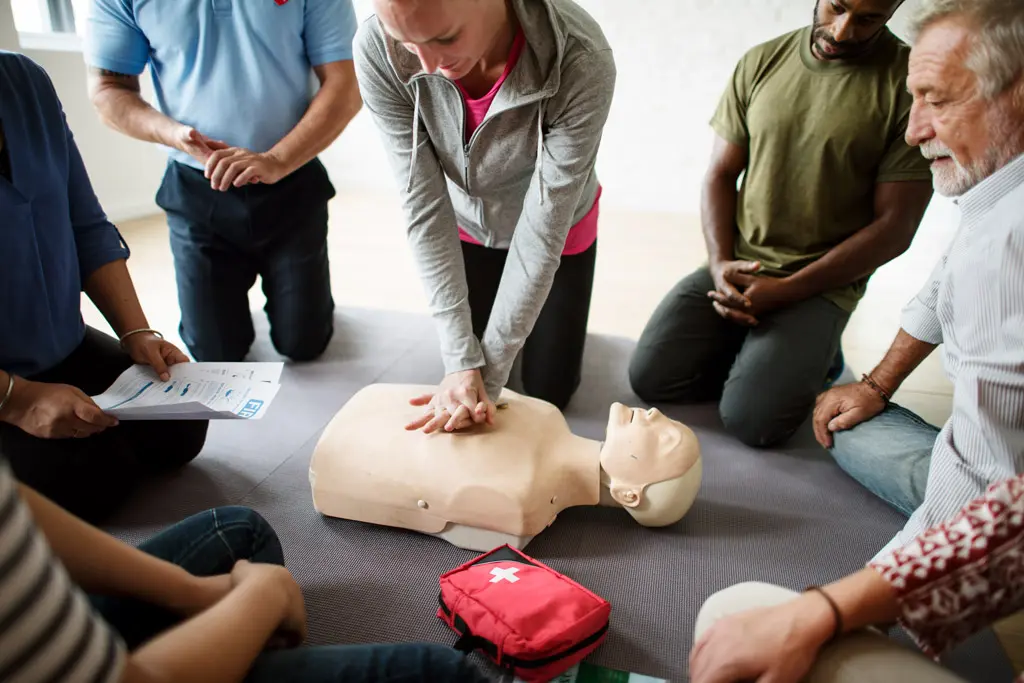
-
Course objectives
By the end of the course, the student will be able to:
Demonstrate knowledge of:
State/Territory regulations, first aid codes of practice and workplace procedures including:
- ARC Guidelines relevant to provision of CPR and first aid
- Safe work practices to minimize precautions risks and potential hazards
- Infection control principles and procedures, including use of standard
- Requirements for currency of skill and knowledge
Legal, workplace and community considerations, including:
- Awareness of potential need for stress-management techniques and available support following an emergency situation
- Duty of care requirements
- Own skills and limitations
- Respectful behavior towards a casualty
- Consent
- Privacy and confidentiality requirements
- Importance of debriefing
Considerations when providing first aid including:
- Airway obstruction due to body position
- Appropriate duration and cessation of CPR
- Appropriate use of an AED
- Chain of survival
- Standard precautions
- How to conduct a visual and verbal assessment of the casualty
- Principles and procedures for first aid management of the following scenarios:
- Abdominal injuries
- Allergic reaction
- Anaphylaxis
- Basic care of a wound
- Bleeding control
- Burns
- Cardiac conditions, including chest pain
- Choking and airway obstruction
- Diabetes
- Dislocations
- Drowning
- Envenomation
- Environmental impact, including hypothermia, hyperthermia, dehydration and heat stroke
- Eye and ear injuries
- Fractures
- Febrile convulsions
- Head, neck and spinal injuries
- Minor skin injuries
- Needle stick injuries
- Poisoning and toxic substances
- Respiratory distress, including asthma
- Seizures, including epilepsy
- Shock
- Soft tissue injuries, including strains and, sprains
- Crush injuries
Considerations when providing first aid including (cont):
- Stroke
- Unconsciousness
- Basic anatomy and physiology relating to:
- Considerations in provision of first aid for specified conditions
- Chest
- How to recognise a person is not breathing normally
- Response/consciousness
- Upper airway and effect of positional change
Demonstrate skills in the following:
Followed DRSABCD in line with ARC guidelines, including:
- Performed at least 2 minutes of uninterrupted single rescuer cardiopulmonary resuscitation (CPR) (5 cycles of both compressions and ventilations) on an adult resuscitation manikin placed on the floor
- Performed at least 2 minutes of uninterrupted single rescuer CPR (5 cycles both compressions and ventilations) on an infant resuscitation manikin placed on a firm surface
- Responded appropriately in the event of regurgitation or vomiting
- Managed the unconscious breathing casualty
- Followed single rescue procedure, including the demonstration of a rotation of operators with minimal interruptions to compressions
- Followed the prompts of an Automated External Defibrillator (AED)
Responded to at least two simulated first aid scenarios contextualised to the candidate’s workplace/community setting, including:
- Conducted a visual and verbal assessment of the casualty
- Demonstrated safe manual handling techniques
- Post-incident debrief and evaluation
- Provided an accurate verbal or written report of the incident
On successful completion students will be issued with:
Statement of Attainment in HLTAID009 Provide cardiopulmonary resuscitation, HLTAID010 Provide basic emergency life support, HLTAID011 Provide first aid. -
Course assessment
Students will be assessed to determine their competency in these courses
both theoretically and practically.The theory assessment consists of multiple choice and short answer questions.
The practical assessment will require students to apply the DRS ABCD
to an adult and infant mannequin and manage a casualty until help is on the scene. The student will also be required to apply first aid
procedures for the following:- Allergic reaction
- Anaphylaxis
- Bleeding control
- Choking and airway obstruction
- Envenomation, using pressure immobilisation
- Fractures, sprains and strains, using arm slings, roller
bandages or other appropriate immobilisation techniques - Respiratory distress, including asthma
- Shock
-
Related training course
- Provide Cardiopulmonary Resuscitation
- Provide First Aid
- Rescue from a Live Panel
Ready to book or have an enquiry?
Our team will get in touch with you to discuss your specific needs and provide an obligation free quote. We tailor our Training to be specific to your needs.
Get a quesions?
Monday - Friday: 9:00am - 5:00pm, AEST
